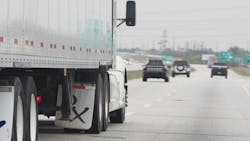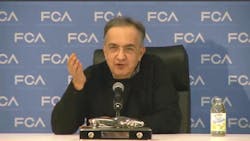'Big issue yet untouched': With self-driving vehicles, who'll be liable?
Amid diesel emissions talk swirling around Fiat Chrysler Automobiles last week came a reminder of an issue going forward with autonomous vehicles: who will be liable in case something goes wrong with these things?
And it's a very significant issue, given the general public's "trust gap" when it comes to self-driving cars and trucks. Analysts such as John Larkin, managing director and head of transportation capital markets research for Stifel Capital Markets, have pointed out the good deal of inherent distrust of fully self-driving vehicles and regulatory frameworks still to be set before autonomous vehicles go mainstream.
"It seems as though we're getting pretty close to where a lot of the technology elements [of autonomous vehicles] are working," Larkin noted. "The problem, it appears, is on the regulatory front, since the average person is not going to be too comfortable with a driverless vehicle at least initially, until they can be confident the driverless vehicle is safe."
As in safe enough to deliver a load of Budweiser on a 120-mi. route through Colorado, as autonomous developer Otto did with its tractor-trailer last October? That was done on a specific route with a driver in the sleeper berth ready to take over if need be, but it amounts to what the National Highway Traffic Safety Administration recognizes as Level 4 autonomy, what most people would think of as a fully autonomous vehicle that can pilot itself for an entire trip.
Addressing the media during two press sessions, FCA CEO Sergio Marchionne drove at the autonomous liability question while speaking about the automaker's relationship with Google, and more specifically Waymo, Google's self-driving car project.
FCA has provided a fleet of 100 specially built Pacificas to Waymo for autonomous testing, and Marchionne noted the relationship is not exclusive but that he hopes it will grow. And for now, the liability of running the fleet is all in Waymo's court, and the FCA chief exec noted "they [Waymo/ Google] are not a tier-one supplier today, they are a customer that has allowed us to come in back and look at what they do."
From that "look," Marchionne said FCA has learned much about what goes into autonomous vehicle operation, but added that he sees automakers continuing to lend their vehicle-building expertise while third parties like Google develop and own — i.e., are responsible for — autonomous technology.
At some point, the autonomous tech companies' and auto manufacturers' relationship could change. Marchionne made a notable statement in that he expects within the next five years, Level 4 autonomous-driving equipment will be "commonplace." That's saying that in the very near future, it'll be the norm for the vehicle you go to buy to have equipment and/or software onboard enabling it to be fully self-driving, at least for certain trips.
"And I think you're going to be seeing more and more of the relevant portion of that escalation to Level 4 appear in some version of our cars between now and 2020," Marchionne predicted. As those parts become added more and more to vehicles, if perhaps waiting to be "switched on" because regulation has yet to catch up, self-driving equipment and software providers may become first-tier suppliers to automakers.
"That's a big issue going forward, because when you've got tier-one suppliers that will start providing autonomous driving equipment — both software and hardware — into these vehicles, the question about who owns liability associated with the running of those operations is a big issue yet untouched," Marchionne said.
"So there's a lot of work to be done by the lawyers," he added, "and also commercially in terms of us assuming responsibility for something that may or may not be within our turf."
From here to there
The liability question is a big one, coupled with the trust gap that exists. But some believe autonomous vehicles are essentially just the latest new technology to be skeptical of, as antilock brakes once were.
"The question about who owns liability associated with the running of those [autonomous] operations is a big issue yet untouched."—Sergio Marchionne, CEO of Fiat Chrysler Automobiles |
"Antilock brake systems were smarter than the old systems, and suddenly you were supposed to just slam the brakes down and the system would do a better job of stopping you," noted Stephen Gilligan, vice president of marketing at Navistar. "People are comfortable with that technology now, and the time frame [of drivers being uneasy with it] came and went."
Also keep in mind that bridge technologies to full autonomy in vehicles are appearing constantly, from the Ford passenger car that will parallel-park itself to the numerous automakers packing automatic emergency braking/ obstacle detection in their cars, SUVs, trucks and vans. Heavy truck makers are not only offering advanced safety systems in their vehicles, they're also working with safety tech companies to integrate those products more deeply into truck systems.
Technology such as augmented reality — possibly taking the form of head-up displays in vehicles — is also expected to help accustom today's drivers to the thought of more assistance from, and eventually control by, the machines.
Will the hiccup in self-driving cars and trucks everyone seems to expect, at least subconsciously, ever come? What will happen if, or maybe when, something goes wrong — and if something does, who'll be holding the bag when a litigious society responds?
About the Author
Aaron Marsh
Aaron Marsh is a former senior editor of FleetOwner, who wrote for the publication from 2015 to 2019.

